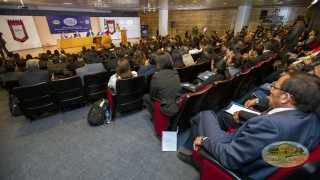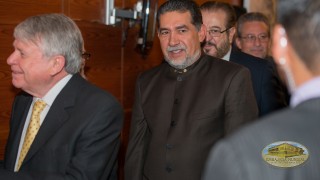Legal Principles Established for the Discussion of the First Lecturers during the Third International Judicial Forum, Mexico 2015.
With the participation of Puerto Rico, Colombia, El Salvador and Mexico
LEGAL PRINCIPLES ESTABLISHED FOR THE DISCUSSION OF THE FIRST LECTURERS DURING THE THIRD INTERNATIONAL JUDICIAL FORUM, MEXICO 2015.
The first lectures of the International Judicial Forum New proposals for the Prevention and Punishment of the Crime of Genocide” were the Global Ambassador and Activist for Peace Dr. William Soto Santiago; Dr. Luis Ernesto Vargas Silva, president of the Constitutional Court of Colombia; Dr. Oscar Armando Pineda Navas, president of the Supreme Court of El Salvador; and Dr. Miguel Ángel López Aguilar, Judge of the Ninth Collegiate Criminal Court of the First Circuit of Mexico.
The Moderator of this table was Dr. Julio Cesar Pineda, an expert in the field of Law and International Relations of Venezuela, who gave a brief summary of the International Judicial Forums held in Colombia and Argentina in 2014, indicating that these events seek to strengthen international law and adapt the global reality of the crime of genocide and extend it to other heinous crimes, which are part of the proposals and modifications the Global Ambassador Dr. William Soto has been expressing throughout these forums.
"Peace is a commitment of every State in the globalized world. It is necessary for governments to promote conditions for a dignified life and professional quality to stress upon the educators, the need to respect human dignity." With these words Dr. William Soto, Global Ambassador for Peace, began his lecture: "Prevention and Punishment of Genocide in the XXI century."
Dr. Soto also indicated that these spaces for discussion are part of the Justice for Peace Project, which must be grounded on truth and respect for human dignity:
"An autonomous and independent justice brings peace and peace is the preamble to happiness and well-being of the human family."
The second speaker was Dr. Luis Ernesto Vargas Silva, Judge from Colombia, with the topic "The Crime of Genocide in Colombian law: progress and challenges." After speaking about various elements that place Colombia as an icon on the criminalization of politicides, Dr. Vargas said:
"If something truly guarantees that we have studied law, that we are judges, that we exert the bench, is the defense of Human Rights, because its violation significantly denotes that we need to approach real acts of peacefulness."
Dr. Oscar Armando Pineda Navas from El Salvador, was the third speaker of this table and addressed the topic: "Genocide throughout history", and made a chronological account of historical events whose characteristics designated them as genocides, but highlighted that:
"Genocide is not limited to mass murder, but also to aberrant violations of human rights manifested by the cancellation of fundamental rights such as freedom, respect for culture, and above all human dignity."
The last speaker of this panel was Dr. Miguel Angel Aguilar Lopez of Mexico, addressing the topic: "Genocide and the Mexican Jurisprudence.". The magistrate was exposing different approaches related to events in Mexico and which are still under study:
"Today, the Mexican Court has established that there is no hierarchy in the issue of human rights, the rules thereof contemplated an equal footing between treaties and the Constitution itself that should be interpreted as the most favorable to the person."
 Dr. Julio Cesar Pineda concluded this section indicating that we are on the path to propose that Latin America can reach specific legal instruments in the region, to legislate genocide and other heinous crimes.
Dr. Julio Cesar Pineda concluded this section indicating that we are on the path to propose that Latin America can reach specific legal instruments in the region, to legislate genocide and other heinous crimes.




